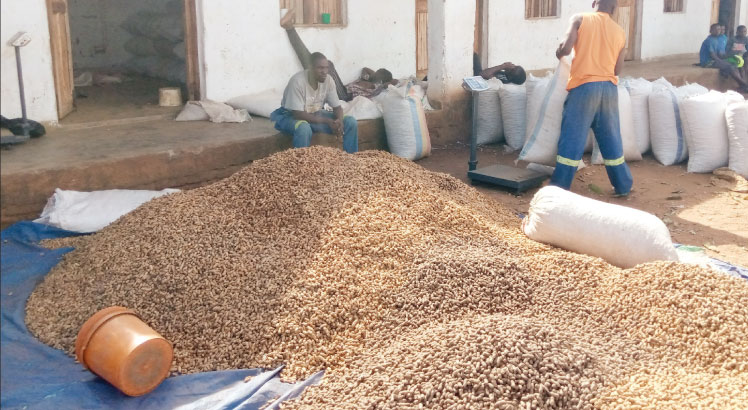Import cover to average 1.2 months this year
Â
 The International Monetary Fund (IMF) has forecast that Malawi’s official import cover will average 1.2 months in 2012, one of the country’s lowest foreign exchange positions in the last decade.
The International Monetary Fund (IMF) has forecast that Malawi’s official import cover will average 1.2 months in 2012, one of the country’s lowest foreign exchange positions in the last decade.
Import cover is the number of months a country can continue to support its current level of imports if all other inflows and outflows cease.
Generally, three months of import cover is internationally accepted as a healthy amount of reserves.
The projected import cover is contained in the fund’s Regional Economic Outlook (REO) for sub-Saharan Africa, titled ‘Sustaining Growth amid Global Uncertainty,’ officially launched in Lilongwe last week.
This development, coming at the back of the current $350 million import backlog, means that critical imports such as fuel, fertiliser and medical drugs are likely to continue being in short supply locally.
Balance of payment
The resultant inability to meet import bills aside, the development also means that government will struggle to service foreign debt and pay expenditures overseas; which will put severe pressure on Malawi’s balance of payment position and further hit the country’s credit worthiness globally.
The news, likely to disappoint many, also comes at a time when hopes of donor aid resumption, frozen last year, are high and were expected to ease hard currency shortages that have hit the real sector.
It also tests the notion, advocated by the IMF and like-minded free market thinkers, that once the kwacha is devalued, forex in black market hands will start flowing into the formal financial system to prop up the current account, which is the difference between a nation’s total exports of goods, services and transfers; and its total imports.
Capital Hill is in the middle of negotiating a new economic programme with the IMF that was expected to help unlock iced foreign resources.
These talks were made possible by Lilongwe succumbing to the 49 percent devaluation of the kwacha this month under the Joyce Banda administration and 10 percent effected last August by the government of the late President Bingu wa Mutharika.
With cotton and tobacco prices remaining depressed this season, the two leading forex generators are unlikely to be of much help in closing the foreign exchange imbalances on the local money market.
Credit rating
Professor of economics at University of Malawi’s Chancellor College, Ben Kaluwa, has warned that a 1.2 months of import cover is potentially dangerous for the health of an economy, saying it might affect the country’s credit rating.
“The rule of thumb is that we must not have less than three months of import cover and 1.2 months is less than half of that. There is queuing for forex when, ideally, we should not have queues,” he said.
On the likely impact of such a low reserve position on businesses, Kaluwa said most enterprises will continue to feel the pinch of foreign exchange scarcity, which could hamper output; result in job losses and shrink the tax base.
The IMF report has also put Malawi’s import cover at the bottom in the group of low income countries.
Benin and Rwanda top the list with a projected 5.2 months of import cover each in 2012.
According to the report, in 2011, Malawi closed with 1.3 months of imports of goods and services, lower than 1.7 months in 2010.
The fund has also projected 1.1 months of import cover in 2013, similar to what the country recorded in 2006, according to the IMF document as the country was recovering from weak economic growth in 2005.
Forex
Some policy makers privately believe that the solution would be to put a tight leash on forex.
“I think the key issue in Malawi should be reserve management to ensure that official public sector reserves are readily available and controlled to meet a defined range of objectives.
“Otherwise, these projections by the IMF mean that businesses will continue to suffer from foreign exchange scarcity,” said a Lilongwe-based economist working for Ministry of Finance. The official declined to be named because he is not authorised to speak on behalf of the ministry.
But in his presentation titled ‘Foreign Reserves Management’ made to business journalists in Lilongwe last week, Franklyn Khoza, a senior analyst at financial markets department at the Reserve Bank of Malawi (RBM) said just like any country, Malawi needs foreign reserves to act as a fund that protects the country against shocks such as the collapse of terms of trade and a plunge in major exports.
He also said adequate reserves strengthen investor confidence, both foreign direct investment (FDI) and portfolio investment, which is an entry of funds into a country where foreigners make purchases in the country’s stock and bond markets.
In its recent weekly market review, Alliance Capital Limited, a portfolio and investment management firm, said official reserves were recorded at $121 million, representing 0.94 months of import cover as at May 18, a marginal decline from the $125 million (or 0.97 months) in the previous week.
During the second 2012/13 pre-budget consultations meeting held in Lilongwe, Finance Minister Dr. Ken Lipenga admitted that the forex position in Malawi remains precarious with less than one month of import cover in official reserves as at the end of April.





